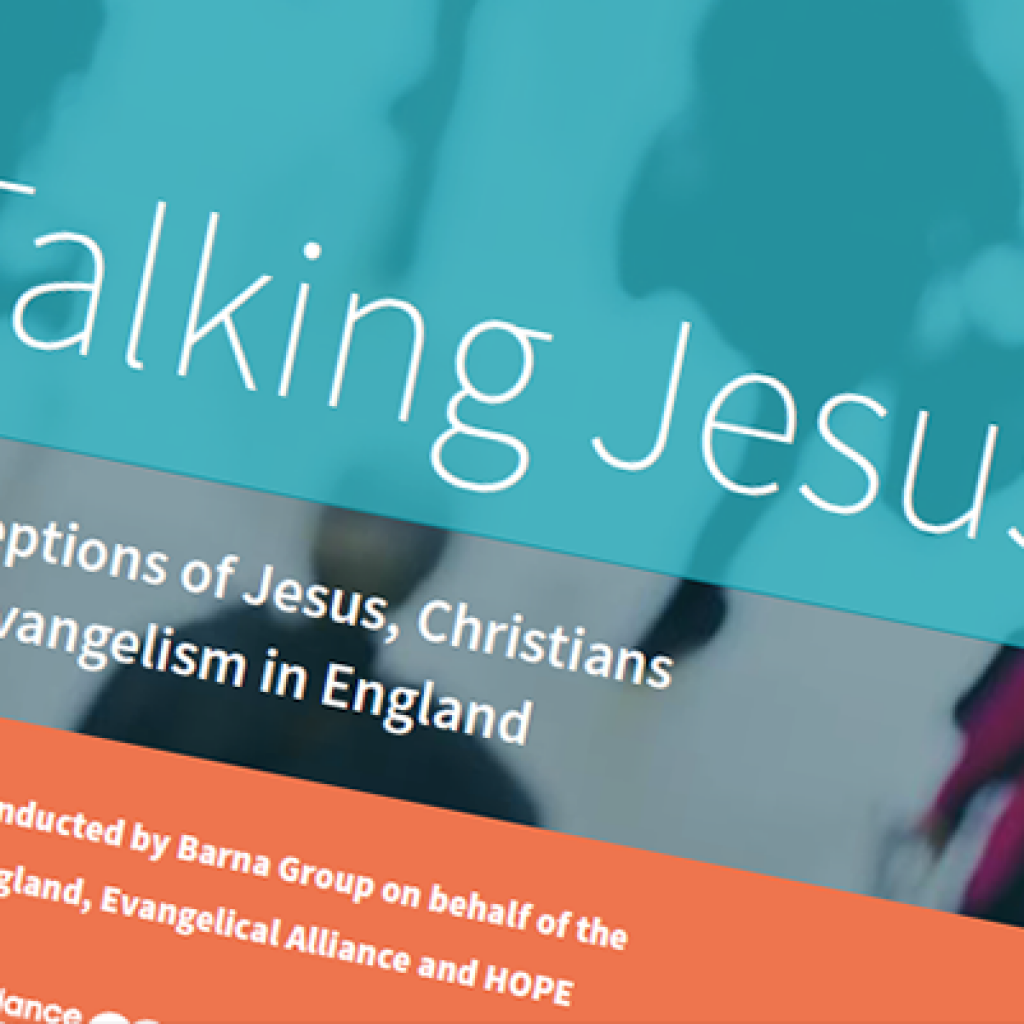…the recent ‘Talking Jesus’ research!
What do the findings mean for us ACTIVATE women?

Okay, so I’m a bit thick when it comes to numbers, graphs and charts. So for me to get excited by a presentation of statistical research – it must have been good!
‘Talking Jesus’ was a research project undertaken by a very reputable organisation in 2015. It aimed to answer questions such as ‘what do people in this country really think about Jesus?’, ‘what do people think about Christians?’, ‘what is that most influences people to become Christians?’ and ‘what happens when Christians open their mouths and talk about Jesus – does that help or hinder?’
These are really key questions for me – I’m a pioneer church minister charged with trying to grow a tiny church into a bigger church (numerically). But I’d like to think they are key questions for Activate women as well. You can look at the research for yourself on www.talkingjesus.org. but if, like me you are bewildered by charts, let me put into simply the key findings that I found so exciting.
Let’s start with how many people define themselves as Christians – 57%
And of these, how many would self-identify themselves as ‘practising’? – 9%
(By the way the definition for ‘practising’ was that they report praying, reading the Bible and attending a church service at least monthly)
 The Bible: The first AMAZING thing for me was this: 39% of people (not just the practising Christians group) believe the Bible is the actual or inspired word of God. 39%!!
The Bible: The first AMAZING thing for me was this: 39% of people (not just the practising Christians group) believe the Bible is the actual or inspired word of God. 39%!!
That’s way higher than I expected. Given that 27% of the practising Christians group attributed their faith to ‘reading the Bible’ we should not give up on simply giving away the Bible, or portions of it or encouraging people to read it for themselves. God still reveals himself powerfully in this way.
Christians: the second amazing thing for me was this: 67% of people know a Christian personally, and the way they are most likely to know them is as a family or friend. Even better news is that when these non-Christians were asked what they thought of those Christians they knew, they ascribed us with overwhelmingly positive attributes (friendly, caring, good-humoured, generous, encouraging, hopeful).
Guess what? They like us! The percentages who said we were ‘narrow-minded, hypocritical, uptight or homophobic, were way, way down – much lower than I expected. That’s because they were being asked about actually people they know not media stereo-types.
We need to be encouraged by this. Non-Christians generally think well of Christians, possibly we might credit this fact to all the initiatives in which Christians are known to be active eg. Foodbanks, night-shelters, compassion ministries, street pastors, etc. But whatever the reason we need to hold our heads up above the parapet and not be so scared by thinking ‘they don’t like us’!
Just one word of warning from this section on ‘how many people know a Christian’ – whilst 67% know a Christian, only 1% know a church leader. What does this tell me (a church leader) about where/how I should be investing my time and effort? It tells me I need to be equipping, encouraging and motivating the Christians in my church to go out and talk about their faith. If only 1% of people know me, then not for one moment must I think that ‘evangelism’ is all down to me – it blatantly is not!
 Conversations and connections: so what does happen when a Christian opens their mouth and talks about their faith in Jesus? Well again there is encouraging news: two-thirds of practising Christians have talked about Jesus with a non-Christian in the last month. Yes, I was surprised by that too! I’m not going to go into the credentials for this data but they are very strong, go to the website to see for yourself, so I need to take this at face-value and I’m encouraged by it.
Conversations and connections: so what does happen when a Christian opens their mouth and talks about their faith in Jesus? Well again there is encouraging news: two-thirds of practising Christians have talked about Jesus with a non-Christian in the last month. Yes, I was surprised by that too! I’m not going to go into the credentials for this data but they are very strong, go to the website to see for yourself, so I need to take this at face-value and I’m encouraged by it.
When the non-Christians were asked what they thought after having had a conversation about Jesus there was good news and bad news: 22% were more open to an experience or encounter with Jesus and 19% wanted to know more. Of all age groups the 18-34-year-olds were the most likely to be curious. (Interesting, just as an aside, more 18-34 year olds were likely to use the word ‘leader’ to describe Jesus, than even practising Christians – what does that say about our declaration ‘Jesus is Lord’?)
But the bad news is that 6 in 10 say they don’t want to know more, and a scary 42% said ‘I felt glad I did not share their faith’ Yikes! What is being said in those conversations that leaves people feeling that way??
 How we tell the story clearly matters. Yes, there will always be the ‘offence in the cross’ and the need to talk about forgiveness’ but where do we start in the story? Do we start with ‘there is a God and he actually likes you very much’ or do we start ‘you’re a miserable sinner with not a hope of getting your life sorted out’. Not hard to see how the second message might leave people thinking, “I don’t want to have that kind of faith”.
How we tell the story clearly matters. Yes, there will always be the ‘offence in the cross’ and the need to talk about forgiveness’ but where do we start in the story? Do we start with ‘there is a God and he actually likes you very much’ or do we start ‘you’re a miserable sinner with not a hope of getting your life sorted out’. Not hard to see how the second message might leave people thinking, “I don’t want to have that kind of faith”.
Church and the faith journey: how do people come to faith? In this section I was encouraged by the 28% who said ‘attending a church service’ this reminds me that there is value in making my church services as welcoming as possible. Secondly by the 27% who cited the reading the Bible which I’ve already mentioned. But equal to this was 27% who mention conversations with Christians they know well. So clearly some conversations do go well! In fact 1 in 5 of the people we speak to about our faith will be open to know more so we must not be discouraged. (Even Jesus had similar odds!)
Two things about Church which are very telling: only 1% of people cited new forms of church eg messy church as a way in to faith and only 5% said it was through a church’s outreach programme eg a parent and toddler group or a foodbank. This information is salutary: we must not depend on our ‘programmes’ or ‘events’ as ways that will bring people in. It is not that these don’t have value but the ‘personal’ factor has a much more powerful effect. It is people who bring people in to faith and the faith community – not activities.
 The other thing about church is the astonishing statistic that 81% of practising Christians have a degree level or equivalent qualification, more than twice that in the general population. What does this mean about the way we do church? Well if the person in the pew is very highly likely to be well educated and the person in the pulpit (due to the nature of ministerial training) is also very likely to be highly educated, how comfortable does someone feel if they are much closer to ‘average’ educationally? Can we worship is a way that is authentic but less cerebral, genuine but less wordy?
The other thing about church is the astonishing statistic that 81% of practising Christians have a degree level or equivalent qualification, more than twice that in the general population. What does this mean about the way we do church? Well if the person in the pew is very highly likely to be well educated and the person in the pulpit (due to the nature of ministerial training) is also very likely to be highly educated, how comfortable does someone feel if they are much closer to ‘average’ educationally? Can we worship is a way that is authentic but less cerebral, genuine but less wordy?
Also when I preach do I presume I have to persuade people into belief? Actually 43% of adults already believe that Jesus rose from the dead so it’s pretty likely that if they turn up in my church on Easter Sunday, they are there not because they need to be convinced about the resurrection, my job is not to convince them it happened but to explain why it mattered that it happened and how the fact of it might personally impact on their lives.
There is loads more in this survey that is worth considering. But take heart and speak up, your conversations, especially the positive ones can make a world of difference.
Sheila Bridge (Rev) is Minister in Charge, St Peter and St John Church, Rugby www.sheilabridgeblog.com

